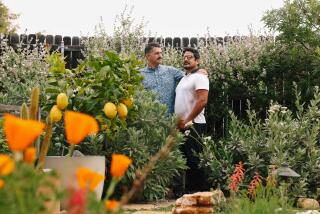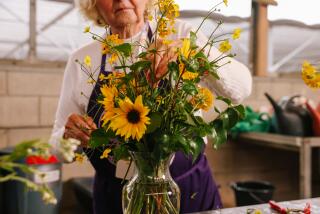The seedless lemon revolution has taken root in California
Thirty miles northwest of Los Angeles, the Lemon Hill grove — a square mile of rolling slopes covered with healthy young trees, laden with fragrant yellow fruit — evokes the Arcadian vistas of classic citrus crate labels. Everything looks familiar, but inside the lemons there’s a crucial difference: There are no seeds.
You may wonder what took so long, since most other kinds of citrus have largely lost their seeds. But standard lemon varieties such as Eureka and Lisbon are hard to crossbreed, because they closely derive from one ancestor, a natural hybrid of citron and sour orange that originated thousands of years ago in northeastern India.
The grove is part of a huge bet by America’s largest fruit grower that it can revolutionize a historically unvarying California crop. And if you’ve ever seen the face of a prep chef who’s been told to slice and seed a carton of lemons, you can imagine the potential.
Almost all true lemons contain seeds and although the number varies greatly from a few to dozens depending on season and pollination, there’s no way to tell from the outside how many pips lie within.
Lemon trees occasionally do develop natural mutations, however, and as long ago as 1939 the U.S. Department of Agriculture brought a variety named Seedless Lisbon from South Australia that was derived from such an occurrence. About 25 years ago, a few California growers planted this variety (since renamed Seedless), but it never really caught on because on average it bore a quarter less fruit than standard seeded lemons.
Moreover, the demand back then for seedless lemons was limited, and they brought little or no price premium over seeded varieties.
“For the most part we sell them as regular lemons, so the lack of production hurts a lot,” said David Roberts of Visalia, one of the earliest and largest growers of this variety.
Editor’s note: This article was originally published in Slake in February 2011 Visitors to the Norton Simon Museum, the collections jimmied into the corpse of the former Pasadena Art Museum, come to admire the handsome Frank Gehry garden, the shimmering tiles by Edith Heath, and what is probably the most impressive group of Rembrandt paintings on the West Coast.
But as seedless mandarin production boomed over the last two decades, breeders and farmers around the world, searching for the next big thing, discovered at least two dozen low-seeded or seedless lemon varieties.
South African growers planted thousands of acres of one called Eureka SL for export markets, and a diaspora of South African citrus scientists vied to introduce the most promising new seedless lemon varieties to California, keeping their moves secret to forestall competitors.
Until now, however, all the new varieties proved insufficiently productive, shapely or seedless to compete with regular lemons and never made the big time here.
Enter the Wonderful Company, which is based in Los Angeles and grows 160,000 acres of fruits and nuts, including vast orchards of citrus, almonds and pistachios. Twenty years ago it gambled on two minor fruits — pomegranates and mandarins — and turned them into superstars. (The company’s owners, Stewart and Lynda Resnick, are somewhat controversial billionaires who recently pledged $750 million to Caltech for climate research.)
Etienne Rabe, vice president of horticulture for Wonderful Citrus in Delano, Calif., snapped up exclusive United States rights to two highly productive seedless lemon varieties, Code 3X97 and 7ELS1 (yes, new varieties typically sport such gobbledygook names). Both originated with 2PH Farms (named after the acidity of lemon juice) in Queensland, Australia, from Eureka bud sticks, wood for grafting that was treated in the late 1990s with gamma irradiation to induce mutations that rendered their progeny seedless.
Starting in 2015, Wonderful Citrus and its affiliated growers planted 3,500 acres of seedless lemons — a few Eureka SL but mostly the 2PH varieties — in the San Joaquin Valley, Ventura County and the Coachella and Imperial deserts, Rabe said. These will ripen from late October to June; another 1,000 acres of trees are on order for next year and some will be planted in northeastern Mexico, where fruit ripens from July to October.
The horticultural challenges are considerable, but with the aid of new rootstocks, careful pruning and nutrition management, so far the seedless lemon plantings look good.
“I believe they’re going to be just as productive as regular seeded lemons,” Rabe, 63, said.
Wonderful Citrus’ seedless lemons are slightly earlier, larger, thinner-skinned and juicier than regular lemons, but consumers probably won’t notice any difference, he added.
Samples I tried over the last three years tasted just like regular seeded lemons in all aspects, including acidity and aroma.
“I buy 15 to 30 pounds of lemons a week, and deseed them myself,” said Jill Davie, who is chef-owner of the Mar Vista and has worked as Sunkist’s Lemon Lady. “Seedless would be amazing, although for juicing it wouldn’t make much difference.”
Others are dubious.
“I prioritize flavor and quality over convenience, so the lack of seeds doesn’t matter to me,” said Julia Hauben, a private chef who also sells seeded Lisbon lemons at her family’s Penryn Orchard Specialties stand at the Santa Monica Farmers Market.
“I like seeds because they contain pectin that I use in making lemon marmalade,” she added. “And seeds are a sign of natural fruit production, of the presence of pollination and bees.”
One- and two-pound mesh bags of Wonderful Seedless Lemons, as they are branded, will be available starting this week at local and national market chains, including Albertsons, Ralphs and Gelson’s in Southern California.
Adam Cooper, senior vice president of marketing for the Wonderful Company, estimates that the company’s seedless lemons will command a 50% premium over seeded fruit, boosted by a “robust marketing plan” including prominent displays in stores.
Rabe said that in a few years Wonderful’s seedless plantings will account for 10% of the United States lemon market, and the company’s ambition is that seedless lemons will ultimately replace seeded.
“They’re very smart, they’re market-driven and they put a lot of dollars behind any commodity that they do,” said Alex Teague, chief operating officer of Limoneira, a major lemon grower and competitor.
“They’ll drive demand,” he said. “I think they’ll succeed.”
So don’t be surprised to see Tom Brady passing a giant seedless lemon in a Super Bowl ad. Whether Wonderful’s gamble on seedless lemons results in a touchdown, only time will tell.
More to Read
Eat your way across L.A.
Get our weekly Tasting Notes newsletter for reviews, news and more.
You may occasionally receive promotional content from the Los Angeles Times.






